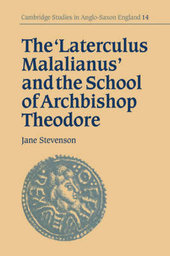
|
The 'Laterculus Malalianus' and the School of Archbishop Theodore
Paperback / softback
Main Details
Description
The Laterculus Malalianus, a historical exegesis of the life of Christ, appears to be the only complete text to survive from the hand of Archbishop Theodore at Canterbury. Its language, style and intellectual frame of reference are thus of great importance for establishing the nature and scope of teaching at Canterbury, the first school of Anglo-Saxon England. This edition, with translation and commentary, is the third volume in this series to offer a reassessment of Canterbury as a major seat of learning, together with Bernhard Bischoff's and Michael Lapidge's edition of the biblical commentaries from the Canterbury school and Michael Lapidge's edited collection of essays on the life and influence of Archbishop Theodore. In the introduction Jane Stevenson examines the intellectual milieu of this work, argues the case for attribution to Theodore, and suggests the need for a complete rethinking of the basis of Anglo-Saxon culture.
Reviews"This text, part of the recent discovered collection of texts, provides the bases of a complete reconsideration of the religious bases of Anglo-Saxon Christianity...Highly recommended." The Reader's Review "...represents a significant advance in the understanding of earlier Anglo-Saxon culture and may serve as examples of creative scholarship and models for future work in an area of study it has opened for all." Paul E. Szarmach, Journal of Religion "Jane Stevenson has performed a genuine service for medieval studies by making available in an exemplary fashion a hitherto little-known work of an undeniably odd sort while at the same time establishing in a broad context both the work's important and, almost certainly, its authorship. Stevenson's presentation is almost beyond praise." Richard W. Pfaff, Speculum
|